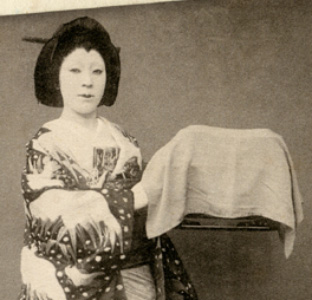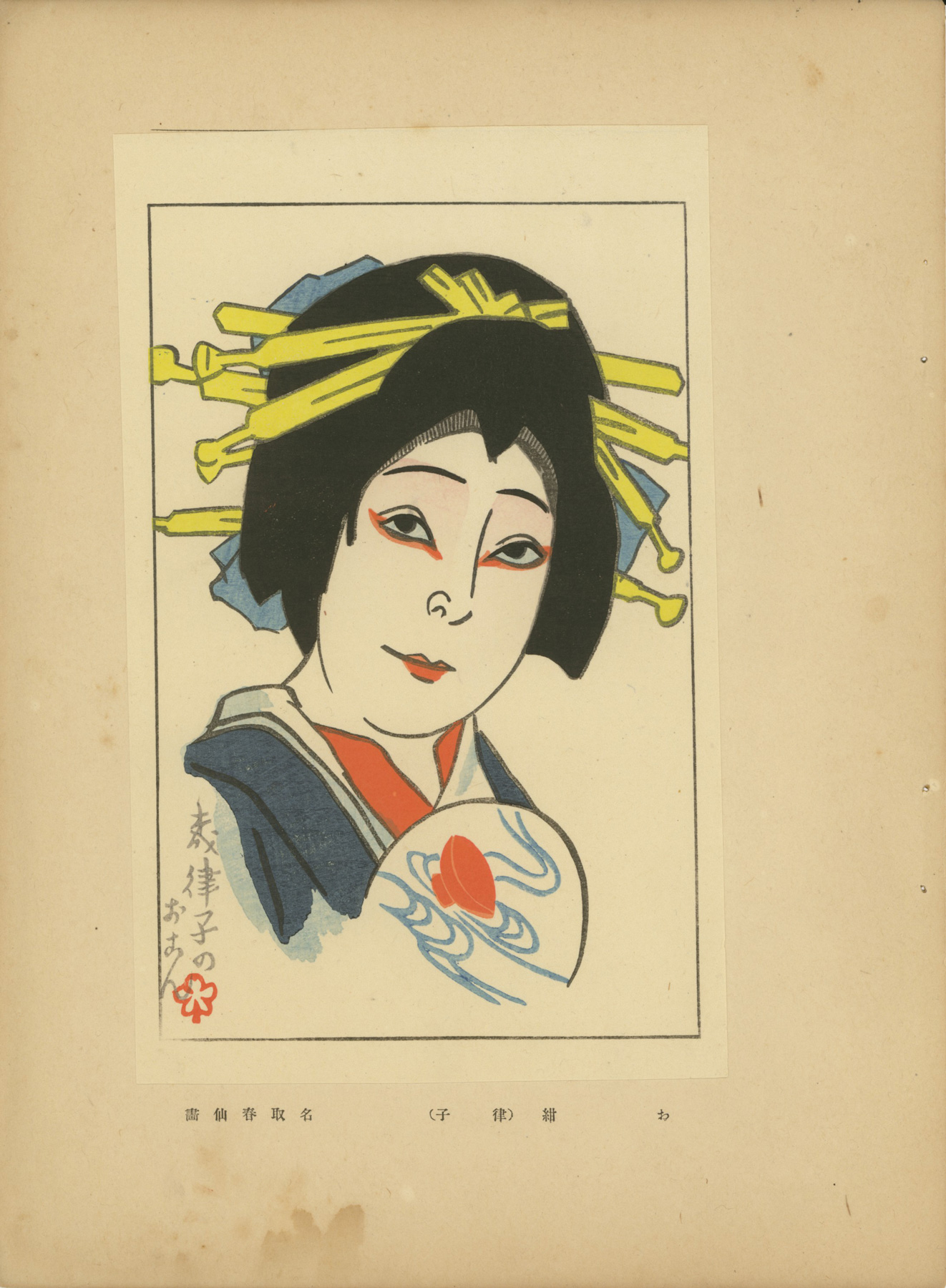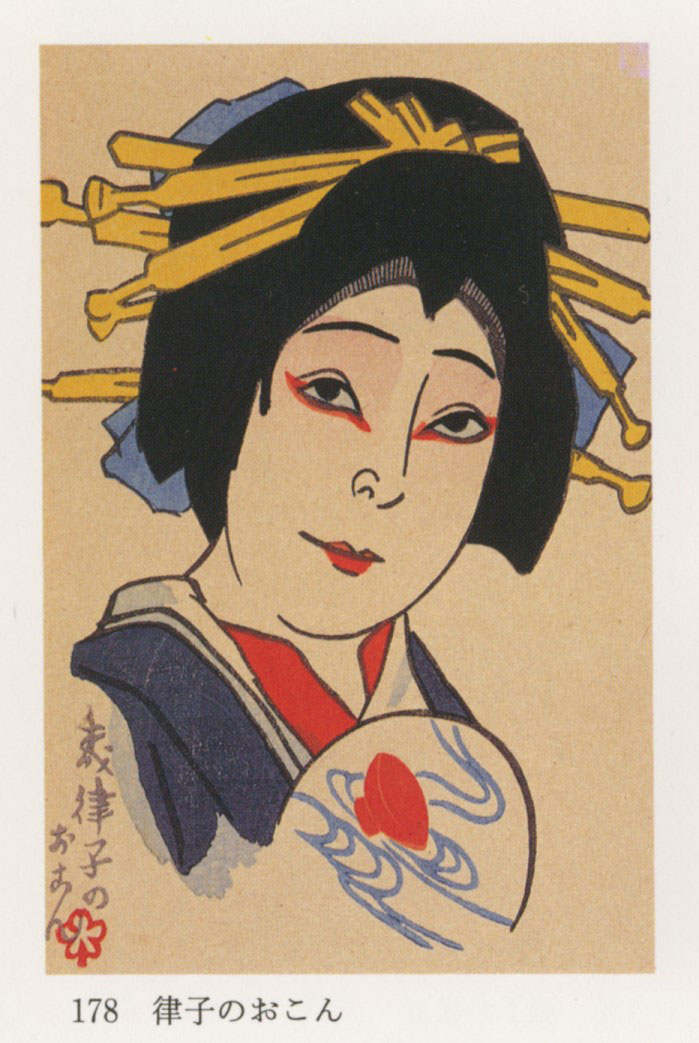About This Print
One of 30 prints (including 2 cover prints and 2 frontispieces) designed by Natori Shunsen that appeared in the magazine Shin Nigao, whose purpose was to advertise the Kabuki theater and renew interest in actor prints. This print depicts actress Mori Ritsuko in the role of the beautiful courtesan Okon in the play Ise Ondo Koi no Netaba 伊勢音頭恋寝刃 performed at the Imperial Theatre (帝国劇場, Teikoku Gekijō).
For more information on this short-lived magazine whose purpose was to advertise the Kabuki theater and renew interest in actor prints, see the article Shin Nigao Magazine.
Mori Ritsuko (1890-1961) was a former student at Kawakami Sadayakko’s Actress Training Institute and an actress at the Imperial Theater (Teikoku Gekiyo).

Author: Chikamatsu Tokuzō
History: The drama "Ise Ondo Koi no Netaba" was premiered in July 1796 in Osaka, produced at the Kado no Shibai by the zamoto Fujikawa Hachizô III [casting]. It was based on a real savage mass murder, which happened the same year in Ise.
Structure: "Ise Ondo Koi no Netaba" is made up of 4 acts, divided in 7 scenes. The third act, made up of two scenes, "Aburaya" (at the Aburaya, a Geisha House in Ise Furuichi) and "Okuniwa" (in the inner Garden of the Aburaya), is often staged nowadays.
Plot Summary:
Source: Tokyo National Theatre website http://www.eg-gm.jp/e_guide/eng_showtimes/eng_kokubun_tokyo.html
This play is famous for its classical depiction of a woman who must pretend to reject her lover for his sake and for the beautiful and gruesome dance-like killing scene at the end, done to the music of the Ise pleasure quarters.
Mitsugi, a young apprentice at the holy shrine of Ise tries to help find the stolen treasured sword of his clan out of duty to his former lord. Mitsugi has the sword in his possession, but must now find the certificate of authentication and in order to get it for him, Okon, a courtesan who is in love with Mitsugi must pretend to forsake Mitsugi. But he believes that she has truly betrayed him and further angered by the humiliating accusations of Manno, the head maid of the Aburaya brothel, Mitsugi inadvertently draws the sword and the rampage begins.
last revision:
The Actor in the Print
Source: Acting Like a Woman in Modern Japan: Theater, Gender, and Nationalism, Ayako Kano, Palgrave, 2001, p.260.Mori Ritsuko (1890-1961) was a former student at Kawakami Sadayakko’s Actress Training Institute and an actress at the Imperial Theater (Teikoku Gekiyo).

from an undated postcard of Mori Ritsuko at the Imperial Theater
The Play –Ise Ondo Koi no Netaba (The Ise Dances and Love’s Dull Blade)
Source: Kabuki 21 website http://www.kabuki21.com/ise_ondo.phpAuthor: Chikamatsu Tokuzō
History: The drama "Ise Ondo Koi no Netaba" was premiered in July 1796 in Osaka, produced at the Kado no Shibai by the zamoto Fujikawa Hachizô III [casting]. It was based on a real savage mass murder, which happened the same year in Ise.
Structure: "Ise Ondo Koi no Netaba" is made up of 4 acts, divided in 7 scenes. The third act, made up of two scenes, "Aburaya" (at the Aburaya, a Geisha House in Ise Furuichi) and "Okuniwa" (in the inner Garden of the Aburaya), is often staged nowadays.
Plot Summary:
Source: Tokyo National Theatre website http://www.eg-gm.jp/e_guide/eng_showtimes/eng_kokubun_tokyo.html
This play is famous for its classical depiction of a woman who must pretend to reject her lover for his sake and for the beautiful and gruesome dance-like killing scene at the end, done to the music of the Ise pleasure quarters.
Mitsugi, a young apprentice at the holy shrine of Ise tries to help find the stolen treasured sword of his clan out of duty to his former lord. Mitsugi has the sword in his possession, but must now find the certificate of authentication and in order to get it for him, Okon, a courtesan who is in love with Mitsugi must pretend to forsake Mitsugi. But he believes that she has truly betrayed him and further angered by the humiliating accusations of Manno, the head maid of the Aburaya brothel, Mitsugi inadvertently draws the sword and the rampage begins.
Natori Shunsen Catalogue Raisonné Entry
Catalogue Raisonné – Ukiyoe Kabuki Gi Han Ga: Shunsen Natori
(The Skill of Natori Shunsen in Kabuki Prints),
Kushigata Municipal Shunsen Museum
Kushigata, Japan; 1991, p.93, pl. 178.
(The Skill of Natori Shunsen in Kabuki Prints),
Kushigata Municipal Shunsen Museum
Kushigata, Japan; 1991, p.93, pl. 178.
Print Details
| IHL Catalog | #294 |
| Title/Description | Ritsuko in the role of Okon [in the play "Ise Ondo Koi no Netaba"] お紺 (律子) Okon (Ritsuko) as printed on the original presentation sheet this print is tipped to (shown below.)  |
| Series | Magazine: Shin Nigao (New Portraits) volume three 新似顔 第一年參編 |
| Artist | Natori Shunsen (1886-1960) |
| Signature | Not signed on print; 名取春仙 畫 Natori Shunsen ga printed on bottom of magazine page print was originally tipped to. |
| Seal |  |
| Date | August 1915 |
| Edition | First and only edition printed in Shin Nigao magazine |
| Publisher | Nigaodō 似顔洞 |
| Carver and Printer | Igami Bonkotsu (1875-1933) |
| Impression | excellent |
| Colors | excellent |
| Condition | excellent - toning and staining on magazine page which print is tipped to |
| Miscellaneous | |
| Genre | shin hanga (new prints); nigao-e |
| Format | koban |
| H x W Paper | 7 3/8 x 4 1/2 in. (18.7 x 11.4 cm) |
| Collections This Print | The British Museum 1991,1112,0.193.3 (entire magazine, only front cover shown); Art Research Center Ritsumeikan University BM-SJ193-03 (British Museum's copy of entire magazine with all pages shown) |
| Reference Literature | Catalogue Raisonné – Ukiyoe Kabuki Gi Han Ga: Shunsen Natori (TheSkill of Natori Shunsen in Kabuki Prints), Kushigata Municipal ShunsenMuseum, Kushigata, Japan, 1991, p. 93, number. 178. |
7/28/2020
11/19/2018



